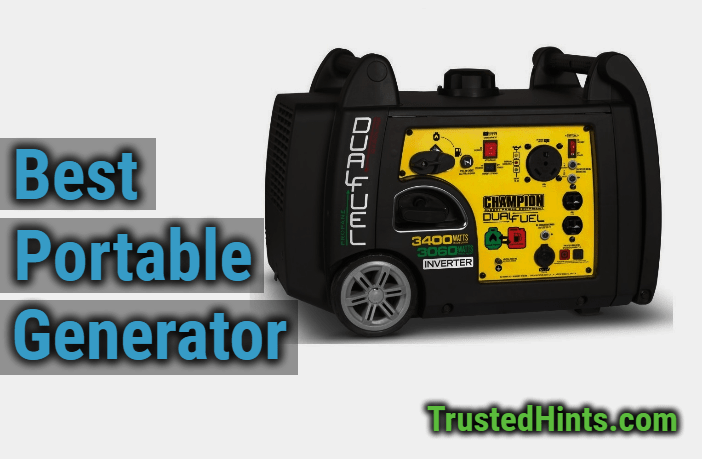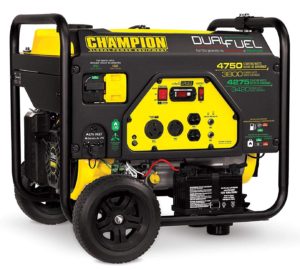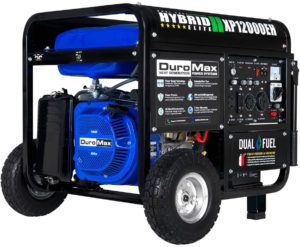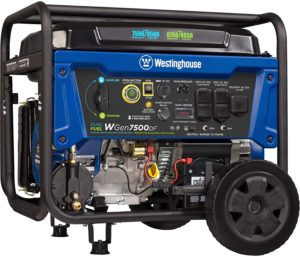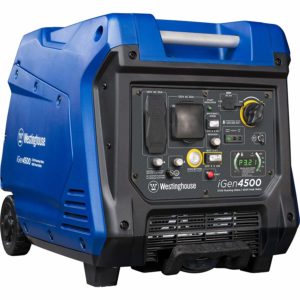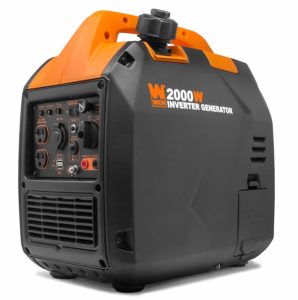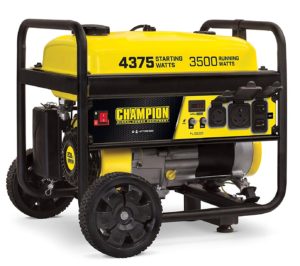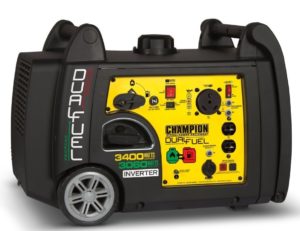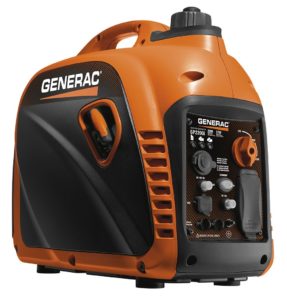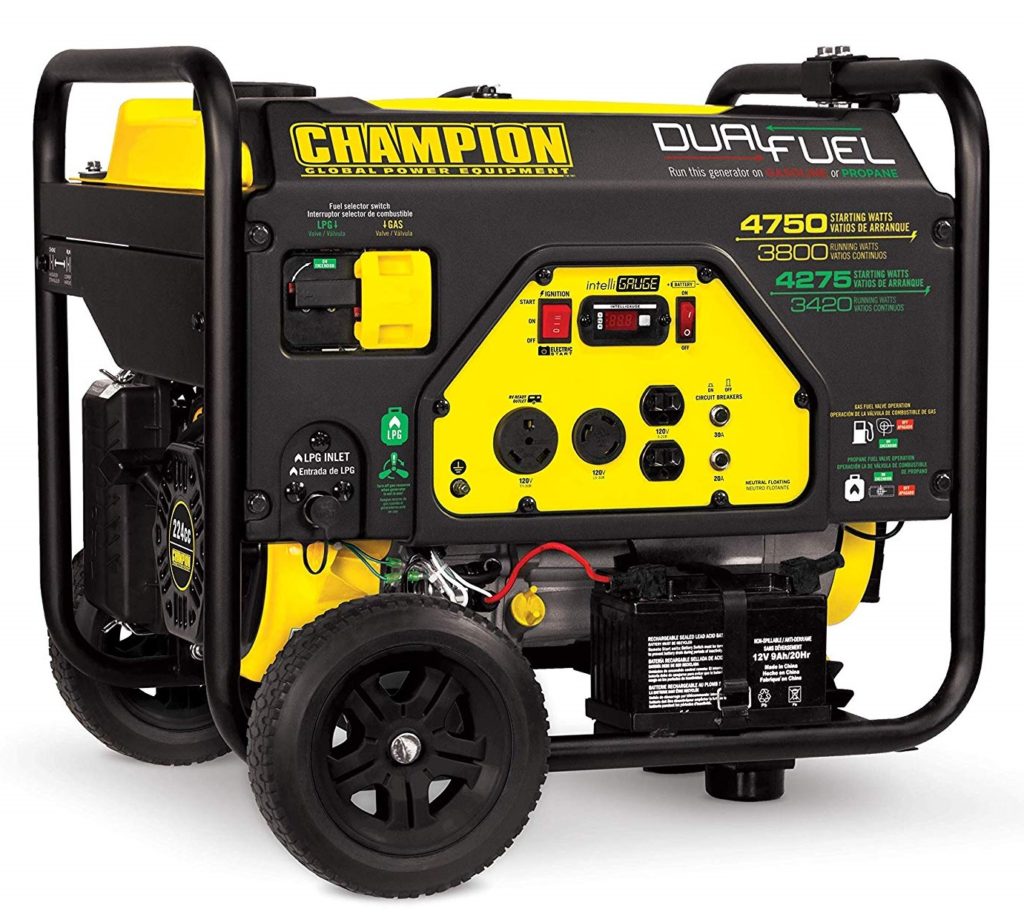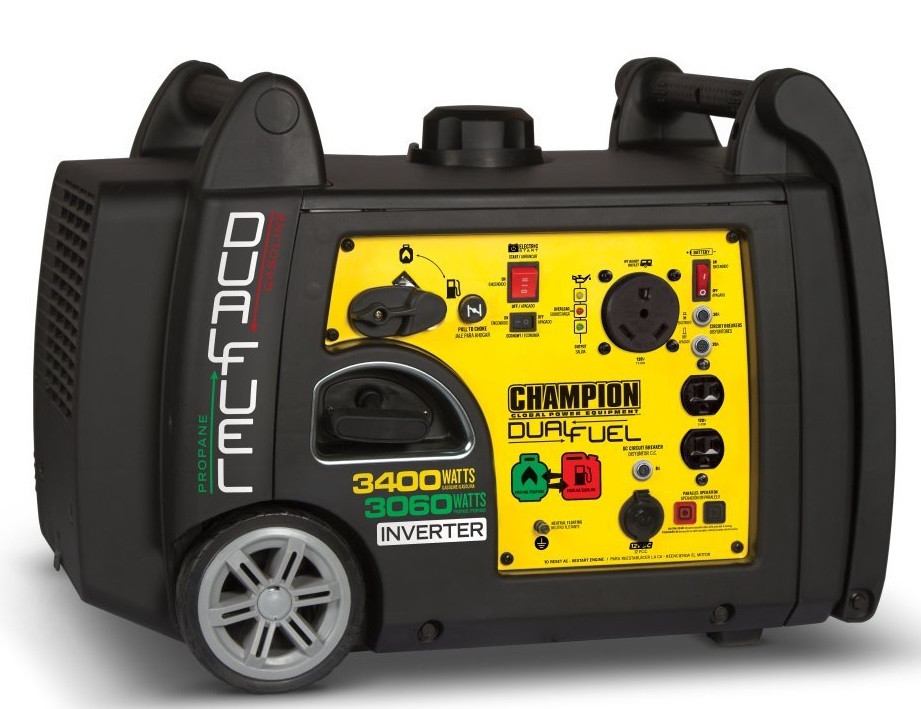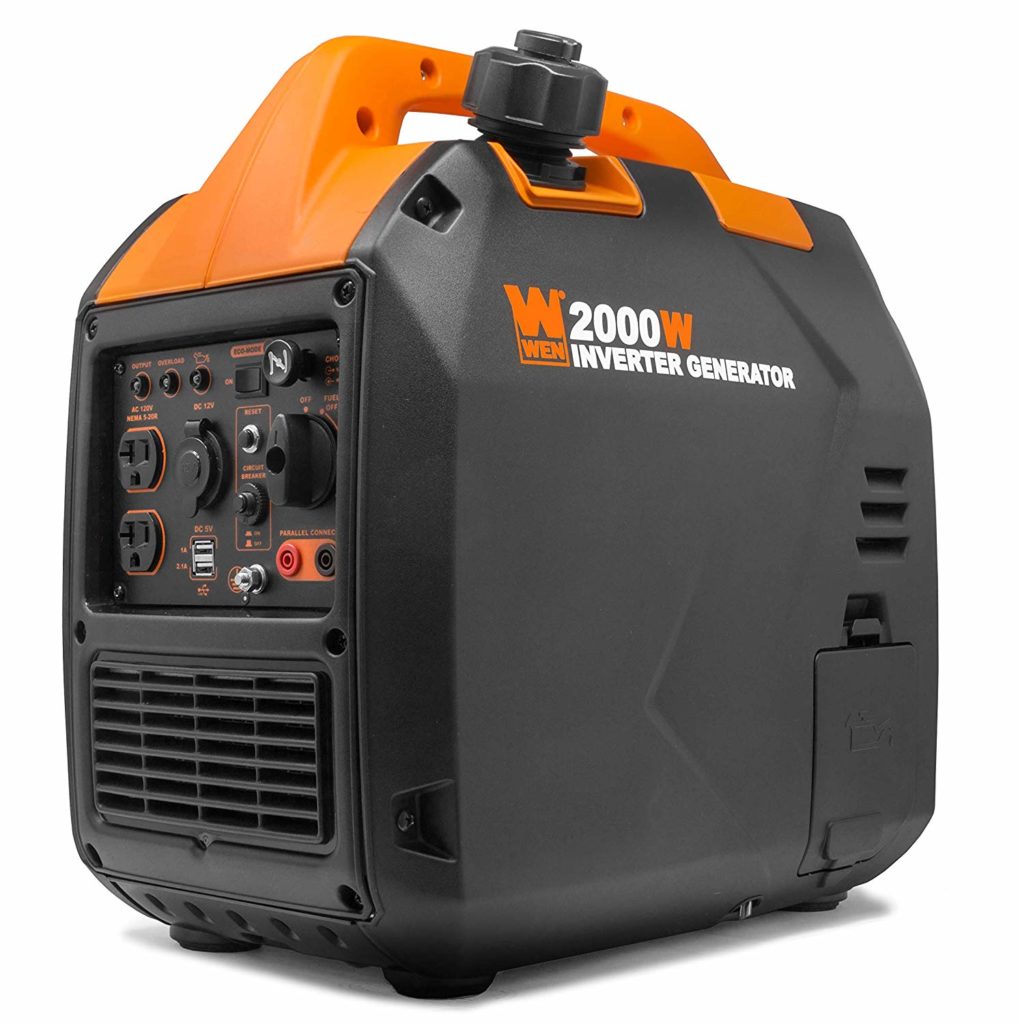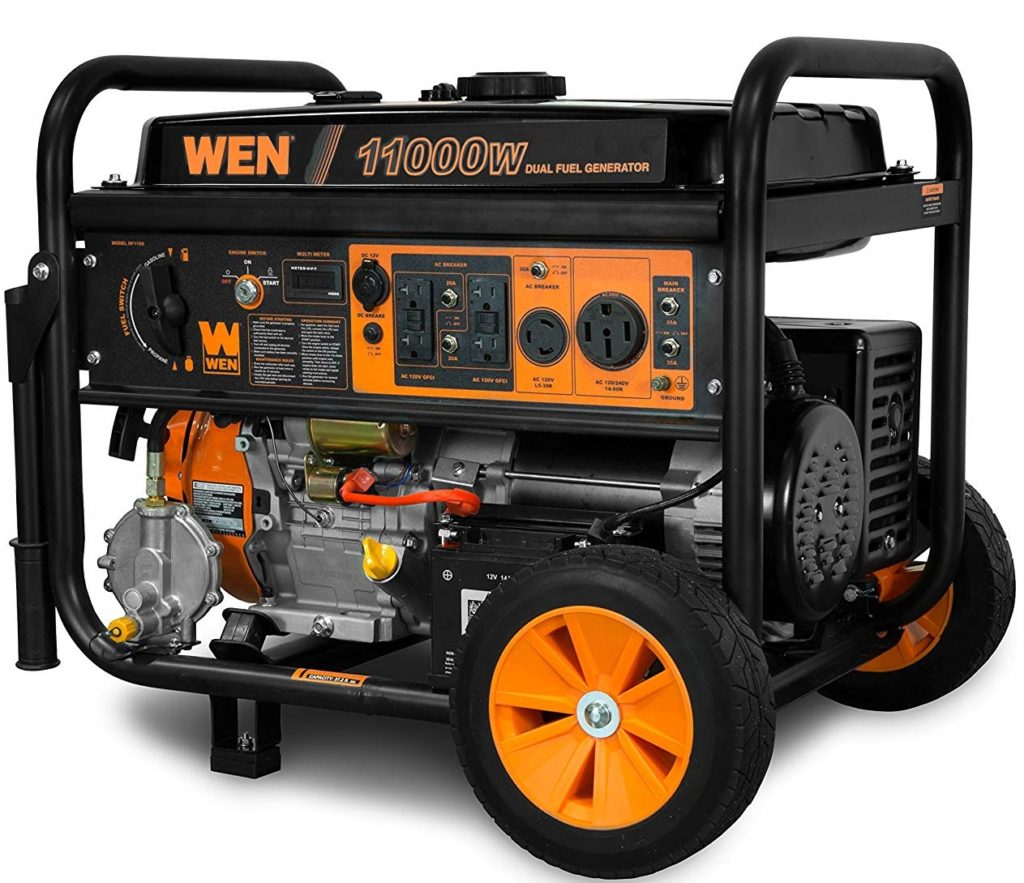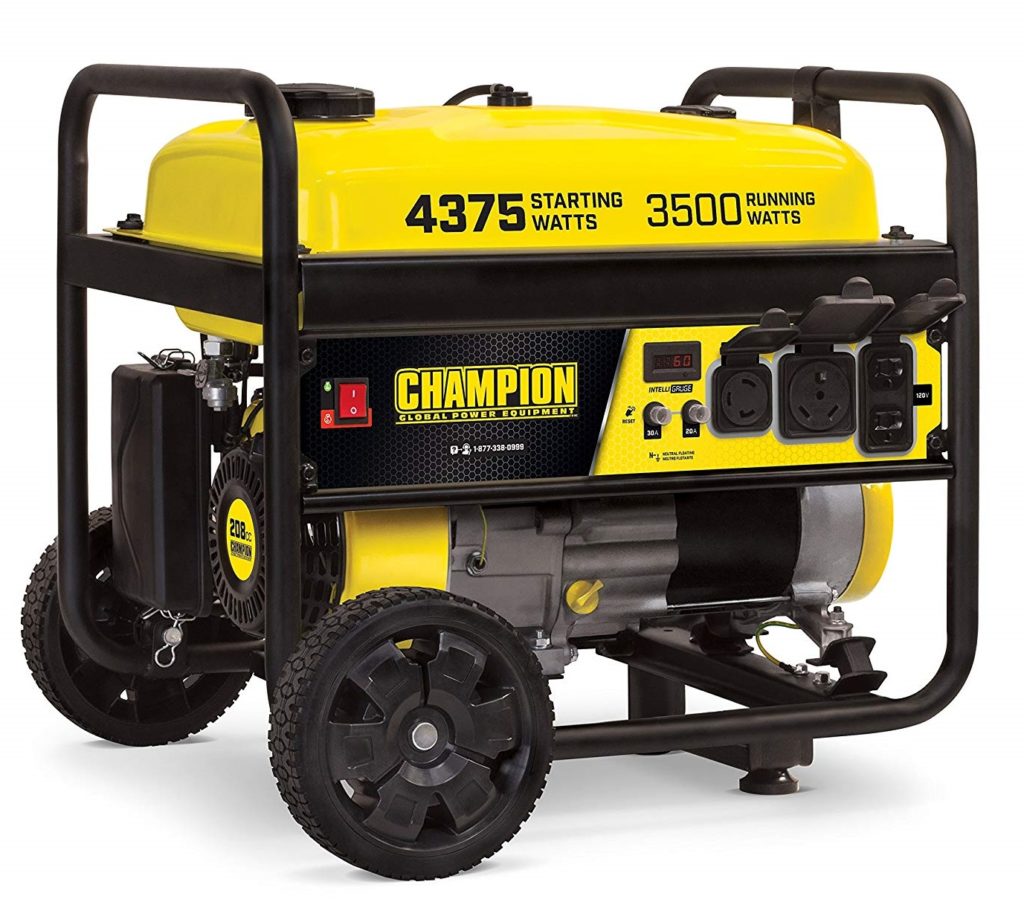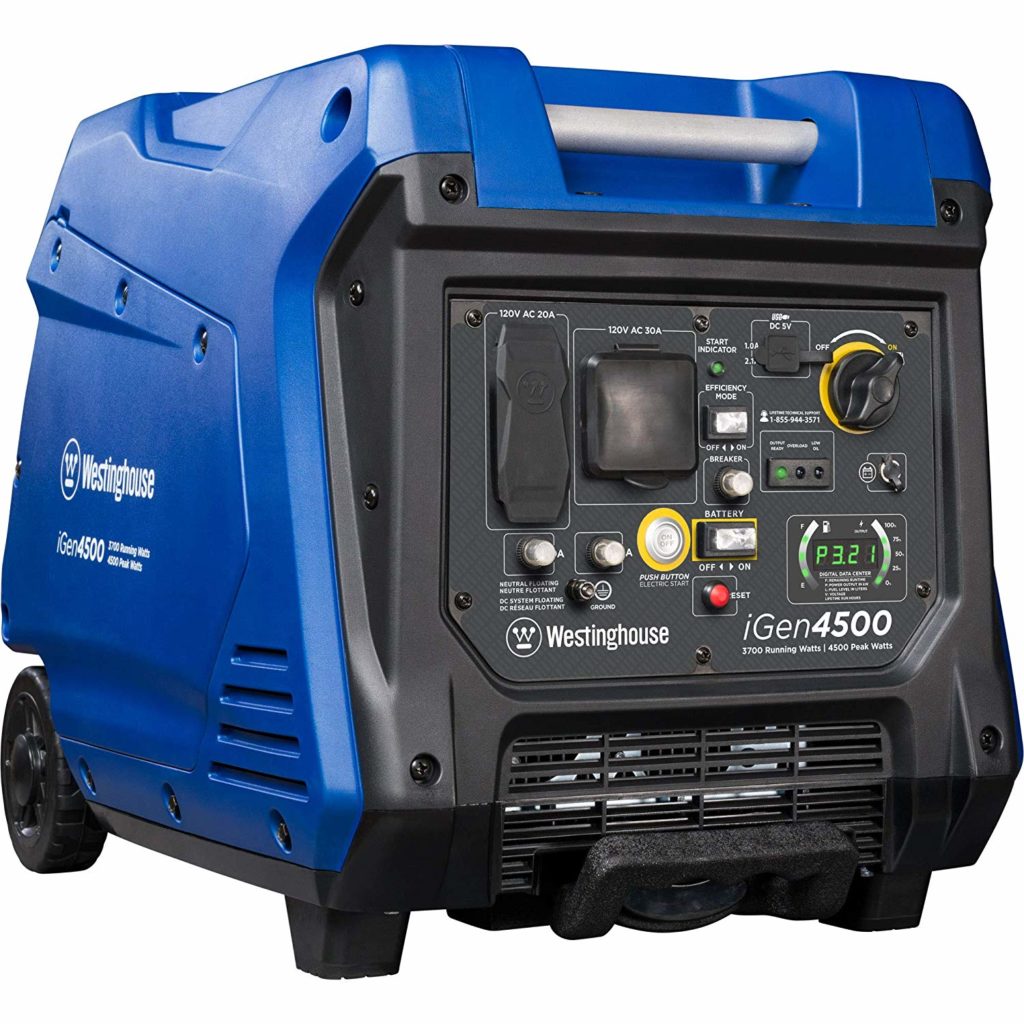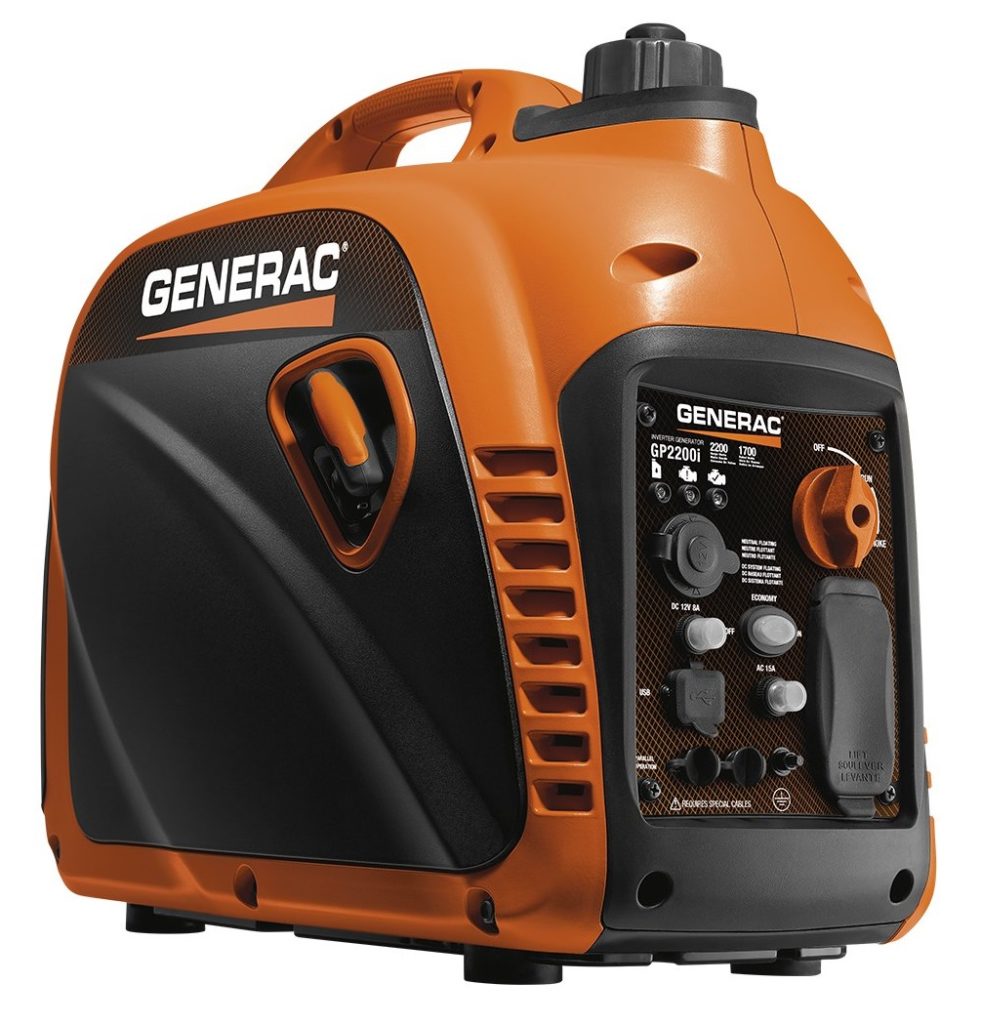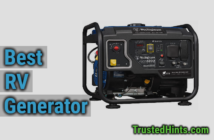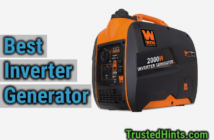A portable generator is a great investment whether you need it for power outages or looking to make camping trips a little more comfortable.
However, with the sheer number of generators available on the market, finding the right one is a tough task. Well, to help you solve this problem, we have tested many portable generators according to their power output, type, noise level, and fuel capacity.
After testing them for days, we came up with the Reviews of Best Portable Generators in 2022.
| Champion 76533 (Best Overall)
  |
| DuroMax XP12000EH (Highest Power Output)
      |
| Westinghouse WGen7500DF (Another High Power Generator)
      |
| Westinghouse iGen4500 (Another Great Portable Inverter Generator)
      |
| WEN 56203i (Most Lightweight & Cheapest Portable Inverter)
   |
| Champion 100522 (Cheapest Portable Generator)
   |
| Champion 100263 (Best Dual-fuel Portable Inverter Generator)
      |
| Generac GP2200i
      |
Best Portable Generator
1. Champion 76533 Dual Fuel Portable Generator
Champion 76533 is our first choice for the best portable generator. Made out of premium materials, this generator is built with excellent craftsmanship.
With the dual-fuel capability, you can use gasoline or propane as you see fit. It is rated for 4750 starting watts and 3800 running watts when operated using gasoline. This power output reduces to 4275 starting watts and 3420 running watts when you use propane.
Due to its decent power output, this generator is perfect for home use, camping, and even job site, so in short, it can tackle a variety of applications.
It has a built-in battery, which allows you to start the generator with one push of a button. Additionally, other features like a low oil sensor, RV ready port, and parallel capability make it more user-friendly.
There are only a few portable generators that are marketed towards RV owners, and Champion 76533 is one of them. Thanks to its included propane hose, you can use this generator right out of the box.
With its 3.4 gallons fuel tank, you will get 9 hours of runtime at 50% load. For extra protection, there is a volt-guard (also known as surge protector) that protects your appliances from spikes of voltage above safe value.
- Excellent power output
- 3.4-gallon gasoline tank
- Dual-fuel capability
- Safety fuel selector switch
- Three-year warranty by Champion
- None
2. Champion 100263 Dual-fuel Portable Inverter Generator
If you want to enjoy the double fuel system with inverter capability, then Champion 100263 is for you. Being a portable inverter generator, it provides pure sine wave power (which contains less than 3% THD), less noise, and improved fuel efficiency.
Most generators come with a pull recoil start, which is very cumbersome, so the electric start feature of this unit will give you an advantage. The 3-position ignition switch enables you to start the generator effortlessly and let’s not forget the cold start technology of this portable generator.
It features 2790 rated watts when you use the propane, and this power output can be increased up to 3100 running watts by using gasoline.
The Champion 100263 is surprisingly quiet, and in fact, it produces less than 59 decibels of noise, which is the same as the noise level of normal conversation.
This EPA & CARB compliant generator can be used for home backup, camping, tailgating as well as DIY projects too. It weighs around 100 pounds, but a built-in carry handle and no-flat tires make the transportation process hassle-free.
Moreover, its economy-mode adjusts the fuel consumption according to power demand, which results in better fuel economy and extended engine life.
- Inverter technology with economy-mode
- Built-in parallel ready port and RV ready port
- Electric start ability
- It can run on propane as well as gasoline
- Three years warranty with free lifetime support
- Heavier than other same power output generators
3. WEN 56203i Compact Portable Inverter Generator
WEN 56203i is another great product we have added to our list. And it happens to be the most lightweight and compact portable inverter generator on our list.
Its quiet operation and small size is a major selling factor of this generator, and let’s not forget its clean power output, which is important for sensitive electronic devices such as smartphones, tablets, televisions, and computers.
Whenever the generator runs out of fuel, the internal rotor slowly comes to break, and it can damage your appliances. But in this generator, an automatic shutdown feature is added, which shuts down the engine upon detection of low fuel, so it maximizes the engine’s life.
That’s not all; because of this feature, the generator uses the remaining fuel from the carburetor before shutting down. This generator features three output ports, including two 120V household receptacles, one 12V DC port, and two 5V USB ports.
Moreover, its 51 decibels of ultra-quiet operation makes it the quietest generator on the market; besides, most inverter generators are designed to be quiet and the WEN 56203i is no exception.
Additionally, by engaging the eco-mode switch, you can get the quiet operation while maximizing fuel economy. It is also parallel capable, so you can double the power output by linking up two WEN 56203i inverter generators.
- Portable and lightweight unit
- EPA & CARB compliant
- Parallel capable
- Easy to carry
- No fuel gauge
- Low power output
4. WEN DF1100T Dual Fuel Portable Generator
At 8300 running watts, WEN DF1100T is one of the highest power output portable generators we have seen so far. Thanks to its dual-fuel mechanism, this generator can run on gasoline as well as propane by simply turning the dial button.
Due to its high power output, this generator is ideal for home backup power during power outages, and its voltage output can go from 120V to 240V, which is great for transfer switches.
Thanks to its built-in battery, now you don’t have to pull-start your generator, but instead, you can start it with one push of a button. For additional protection, it is equipped with an automatic voltage regulator and overload protection.
The 6.6 gallons of the fuel tank will last for 8.5 hours when you connect the 50% load to this generator, and you can increase this runtime up to a couple of days by connecting the bigger propane tank.
The included GFCI outlets eliminate the need for grounding the generator and WEN DF1100T offers a total of 7 outlets including four 120V GFCI outlets, one 120V twist-lock outlet, one 120V/240V outlet, and one 12V DC outlet.
To top it off, it comes with many accessories such as a bottle of oil, one 47-inch LPG hose, and much more. It is backed by two years of warranty and friendly customer support.
- 11,000 peak watts and 8300 rated watts
- It can run on gasoline as well as propane
- GFCI outlet with wheels & handle kit
- Can deliver 120V as well as 240V
- Heavy & bulky
- Less availability
5. Champion 100522 Gas-Powered Portable Generator
If you are looking for an affordable generator with minimal features, then Champion 100522 might be a good fit for you.
This generator is designed by keeping in mind the safety of your appliances, and that is why it includes a low oil shut-off sensor, and let’s not forget the built-in voltage guard that protects your appliances from overloads and unwanted voltage fluctuations.
It can produce a maximum of 4375 surge watts and 3500 rated watts, and its 5-gallon fuel tank will give you enough power to last about 12 hours on a 50% load.
All the outlets are covered for protection against dust and rust. The dedicated RV-ready port ensures the proper connection of the generator with the RV.
The downside? It does not have a parallel ready port, but with the parallel cables, you can connect it to another portable generator, but it is risky.
The cold start technology makes sure that you can quickly start the generator even in cold weather. In contrast, the foldaway handle and no-flat tires help you transport the generator easily.
Last but not least, Champion 100522 is backed by 3 three years of warranty.
- Cheapest generator with a decent power output
- Low oil shut-off sensor with a surge protector
- Handle with no-flat tires
- Three-year warranty
- Not parallel capable
- No electric start
6. Westinghouse iGen4500 Portable Inverter Generator
Rated at 3700 continuous watts and 4500 peak watts, this portable inverter generator can run 15000 BTU AC easily.
What I like most about this generator is its remote start feature and pure sine wave power output with less than 3% THD (Total Harmonic Distortion).
The 7 HP engine of this generator has a lot of power, and it is reliable enough to last for years, but it is also true that it will consume more fuel than lower HP engines.
It has a 3.4-gallon fuel tank that allows it to run for 18 hours at 25% load, and you can increase this runtime even further by using the efficiency mode.
Its inverter technology offers clean and safe power, and its 52 dBA noise output is considered to be extremely quiet. All the inverter generators are more fuel-efficient than conventional generators, and Westinghouse iGen4500 is a prime example of this.
This inverter generator has EPA, USFS, and CARB certifications so you can use it anywhere you like, including California. The LED display on the panel shows you crucial information like fuel level, power output, remaining runtime, voltage output, and lifetime hours.
The RV-ready outlet (TT-30R) makes it easy to connect the generator with recreational vehicles, and there are other outputs ports too, which can be used for household applications.
Westinghouse is offering three years of warranty on this product and not to mention the free lifetime technical support.
- Good value for the money
- Reputable brand
- Wireless start as well as electric start
- LED display with RV ready port
- Three-year warranty
- No parallel capability
7. Generac GP2200i Inverter Portable Generator
Generac is another great brand that offers the GP2200i portable inverter generator, which is not only easy to use but is also easy to maintain.
Powered by an 80cc 4-stroke engine, it can deliver 2200 surge watts and continuous watts, which makes it a great camping generator.
The lightweight design and built-in carry handle enable you to transport the generator without breaking a sweat. It’s a pity that Generac GP2200i does not feature an electric start, but the integrated choke knob is very helpful and simplifies the startup procedure of the generator.
There is no fuel gauge of any sort in this generator; however, there are some indicator lights on the panel that will alert you when you are running low on oil, or the generator is overloaded.
At 25% load, you can run this portable generator for about 10.5 hours when its 1.2-gallon fuel tank is full. Moving on, its Truepower technology offers clean and stable power, which is important for sensitive electronic devices and appliances.
With its parallel-ready feature, you can handle bigger loads by running two same units together. For a successful parallel connection, you need to purchase the parallel kit separately.
It has only three built-in outlets (number of circuits), which are two 120V AC ports and one USB port. Sold with a two-year warranty and reasonable price range, Generac GP2200i is an excellent choice for campers as well as homeowners.
- Parallel ready
- Clean and stable power output
- Extremely quiet and affordable
- Economy mode
- CARB compliant
- Only 2 AC outlets
- Less powerful than similar models
Buyer’s Guide for The Best Portable Generators
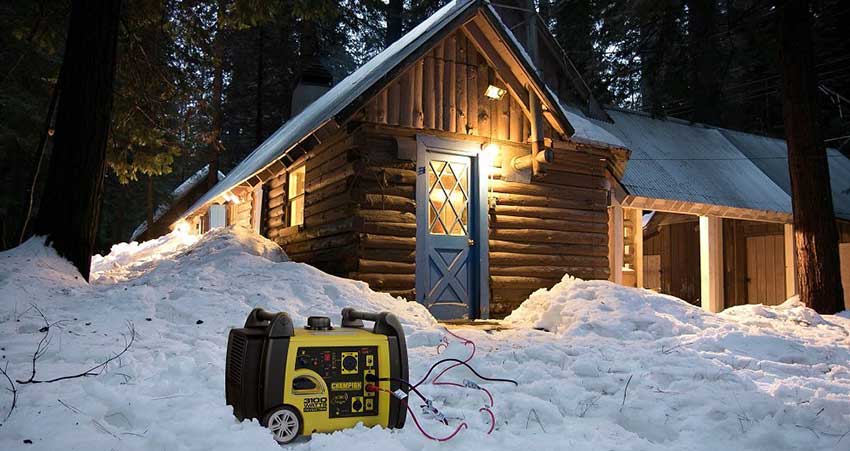

There are so many uses of portable generators, including job-site applications, whole-house backup, camping or recreation use. With so many models available, it will become hard for you to narrow down the ideal portable generator for your needs. At that time, you need to look for additional features in generators, which we have explained below. You should of course consider fuel availability in case of emergency, in which case a multi-fuel device gives you additional protection. See this review of the best multi-fuel portable generators.
1. Power output
First, you need to determine how much power you need from your portable generator, which depends on the number of appliances you are going to run off of your generator.
Generally, appliances have two ratings known as starting watts and continuous watts. Starting watts is the amount of power needed to start any electrical machine. Constant watts is the power required to run any electric machine continuously without any efficiency loss. Usually, the starting watts is three times higher than the continuous watts.
After calculating the starting watts and continuous watts of individual appliances, you can know for sure how many watts of portable generator you need.
2. Fuel type
Gasoline is the most common fuel used in the generator, and it is very easy to come by. On the other hand, diesel generators are very fuel-efficient and cost very little money to operate and maintain the generator.
Battery-powered generators such as solar generator are extremely quiet, requires zero maintenance, and has zero emissions. In all of them, propane is very popular because of its low price, less gas emission, and quiet operation.
But if you need the convenience of using both gasoline and propane in one generator, then you should choose the dual-fuel generators.
3. Fuel tank
The bigger fuel tank will give you more runtime. Many portable generators offer 7 to 9 hours of runtime at 50% load, but this runtime will decrease as the load on the generator increases. The larger fuel tank will result in increased weight and size of the generator.
4. Starting system
Almost all the portable generators come with a recoil start, which is very awkward to use. High-end portable generators employ an electric start system, and using this feature; you can start your generator with one push of a button. However, you need to charge the battery regularly to use this feature.
5. Noise level
High noise-producing generators may affect your hearing, and it will also become frustrating for your neighbors. Therefore, you should buy a generator that generates minimal noise, or you can purchase a long cable to run the generator a few meters away from your house. A small generator will run quieter due to the small engine, so they are ideal for camping and other recreational use.
But if you use the big portable generator, then you won’t find any quiet generator because they all have robust engines and gears; hence the noise output will be considerably high.
6. Ease of movement
Not all portable generators are lightweight. The weight of the generator does not necessarily depend on the amount of power it can produce, but instead, it differs according to the different manufacturers.
However, the high-power output generators are generally heavy because they are equipped with bigger engines. Built-in handle and wheels will help you move around the generator easily, so always select a portable generator with these features.
7. Number of outlets
If you want to run many appliances simultaneously, then having multiple outlets is probably a good idea. Please note that most of the smaller generators only come with two 120V outlets, some DC outlets, and USB output ports.
On the other hand, the generator with high power output likely to have many output ports. Moreover, if you want 240V output power from the generator, then you will have to choose, say, about an 8000-watt generator.
8. Runtime
Generally, the generator’s runtime is measured at either quarter (25%) or half (50%) of the load. This means that how long the generator will run on a full gas tank at the described load. The higher load on the generator will decrease the runtime; therefore, frequent refueling is needed.
If you want to use the generator for home backup during power outages, then you should choose a generator with a bigger fuel tank. Moreover, by using the 40-pound propane tank, you can even run the high power-output generator overnight.
9. Price
The price of the generator depends on,
- Its power output.
- The number of features a generator comes with.
- Its noise rating
- And the manufacturer’s brand.
As you know, the generators of many famous brands such as Honda and Yamaha are very expensive due to the premium materials and high-end engines used in it. But you have a limited budget and looking for an affordable portable generator; then, you can choose a generator from Champion or Westinghouse.
10. Warranty
A Generator is a very pricey machine, and once it gets damaged, it can cost you thousands of dollars to fix it. But if it is backed by a good warranty, then the manufacturer will cover the cost of the repair, or they will replace the generator. A warranty between two to three years is considered to be a decent warranty. Any good manufacturer offers at least two years of warranty so don’t choose any generator that comes with less than two years of warranty.
Click here to read how a portable generator works.
How much power do I need?
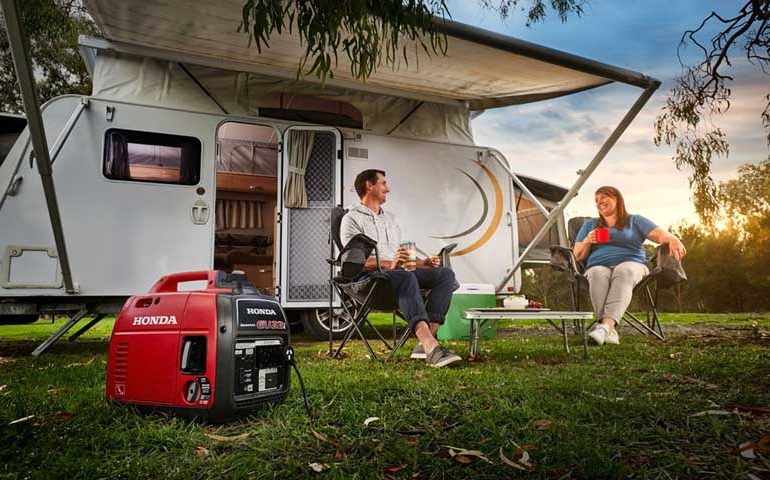

Portable generators come in different sizes with different power ratings. And it can be used for various applications; therefore, your power requirements depend on where you want to use the generator. Following are the applications of a typical portable generator;
- To power household appliances in the event of blackouts or power outages.
- For recreational usages such as camping, fishing, and RVing.
- To power heavy-duty tools on job site, farm, or construction site.
Below, we have explained each of these applications in detail so that you can estimate the amount of power you need from your portable generator.
-
Home Power Requirements
The amount of power you need in your home depends on how many appliances you want to run on your generator. Moreover, you also need to decide which appliances you will be running continuously. By addressing these questions, you will get a clear idea about what size of portable generator you should choose.
For example, during the summer, you are using the air conditioner in your home. Now when the power outage occurs, you would want to run the required appliances in addition to the AC. So for that, you need at least 5000-watts of the generator. And with this amount of power you can run TV, refrigerator, AC and other small electric machines as well.
-
Recreational Power Requirements
A portable generator is a useful gadget for campers, hikers, and RVers. With the help of a generator, they can charge their smartphones, cameras, and other gear when they are in the middle of the jungle during camping trips, or they can power the onboard appliances of an RV.
-
Camping power requirements
You don’t need that big of a generator during camping because the items you take on a trip are very limited. Campers need lights, a phone/laptop, a camera, an electric kettle, and electric grills for food preparations. To run such electric machines, any generator between 1000-2000 watts will be enough.
- Camera and phone charger – 200W.
- Electric kettle – 500W.
- Lights – 150W.
- Small electric grill – 600W.
-
RV power requirements
The generator used for RV needs to be a whole lot of powerful than camping generators. The main reason is that there are a lot of high power-consuming machines on RV such as AC, fridge, sump pump, TV, and other kitchen appliances. To run common appliances in your RV, you will need a portable generator from 3000 to 4000 watts. But if you have other heavy-duty electric machines, then you may want to consider the above 4000-watts generator.
If you require more power, then we advise you to choose the two small generators instead of one big generator because this way, transportation, and maintenance will become easier.
-
Job Site Power Requirements
Job site and construction tools consume a lot of power, and their starting watts are higher than any other appliances because of the high inductive load. For example, any table saw requires at least 3000 starting watts for start-up, and afterward, this power settles down to 1500 watts. This running power increases as you increase the load by cutting a thick piece of wood. To meet the power demand at a job site, you should choose a generator above 7000-watts.
How to determine the power rating of any appliance?
All the appliances have specific power consumption, and it is mentioned on each machine. It can be located either in its name tag or on a product stamp at the bottom. Also, the appliances having inductive loads have two wattage ratings known as peak watts and rated watts, which I have explained earlier.
Sometimes, only the current rating (amps) is written on the appliance, so it can become difficult for you to know the wattage rating, especially when you don’t know how to perform the power conversion.
- Watts = Voltage x Ampere
You can use the above formula to calculate the wattage rating of any machine. Generally, most appliances run on 120 volts, but sometimes the bigger appliance may use 240 volts, so look out for that when you calculate the watts.
Types of Portable Generators
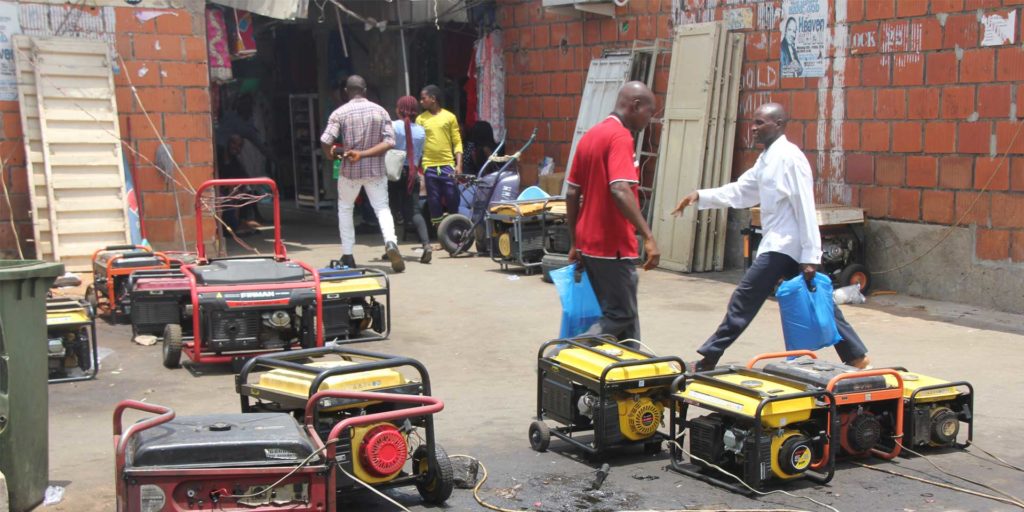

Gas-powered generators are most commonly used, and they are very portable and small. Gasoline is easily obtainable fuel even in the event of a disaster. Just like all the other generators, gas-powered portable generators also produce harmful gas emissions.
Moreover, gasoline has a lifespan of only about 8 to 9 months, which decreases even further for the ethanol mixed gasoline. Gasoline generators are useless in cold weather because of the heat transfer issue of gasoline.
Propane generators are the cleanest running generators available right now, and this is mainly because propane generates the lowest amount of greenhouse gases. Additionally, these generators run quieter and have decent fuel efficiency.
Propane is widely available, and it is stored in a completely sealed tank under high pressure, so it lasts for a literally infinite time. The propane generator is very affordable to run compared to a gas generator and diesel generator. Propane generators are sold in all sizes, and their runtime is very high because it depends on the size of the propane tank.
Solar-powered generators capture the sun’s lights, and with the help of a PV array and charge controller, it is converted into electricity. You can even store this energy in batteries for later use, or by converting it to AC power; you can use it in your house.
There is no moving parts, gears, or engine used in the solar generators, so it does not require any maintenance. And it is safe to use indoors as well as outdoors since they do not deal with any gas emissions.
However, portable solar-powered generators produce less energy compared to gas-powered generators. So unless you have a big place to fit many solar panels, the solar generators are not ideal for powering heavy-duty machines or house backup. The initial cost of the solar generator is high, but after that, all the energy is free, so it is a huge advantage.
In all of the fuels, diesel is very cheap, and it produces more energy per gallon fuel than gasoline or propane. Diesel is easy to obtain, and it has a shelf life of 2 years, which is higher than gasoline.
But on the other hand, portable diesel generators produce more carbon monoxide and other poisonous gases, which is a very serious problem. Also, it can become more concerning when you run your diesel generator indoors.
Another benefit of a diesel generator is that it does not require any spark plug and carburetor and it is really fuel-efficient. On the downside, they are very expensive, heavy, and bulky. So you should use them only where you need to power the heavy-duty tools and machinery. Diesel generators are widely used in bulk power generation, such as power plants.

